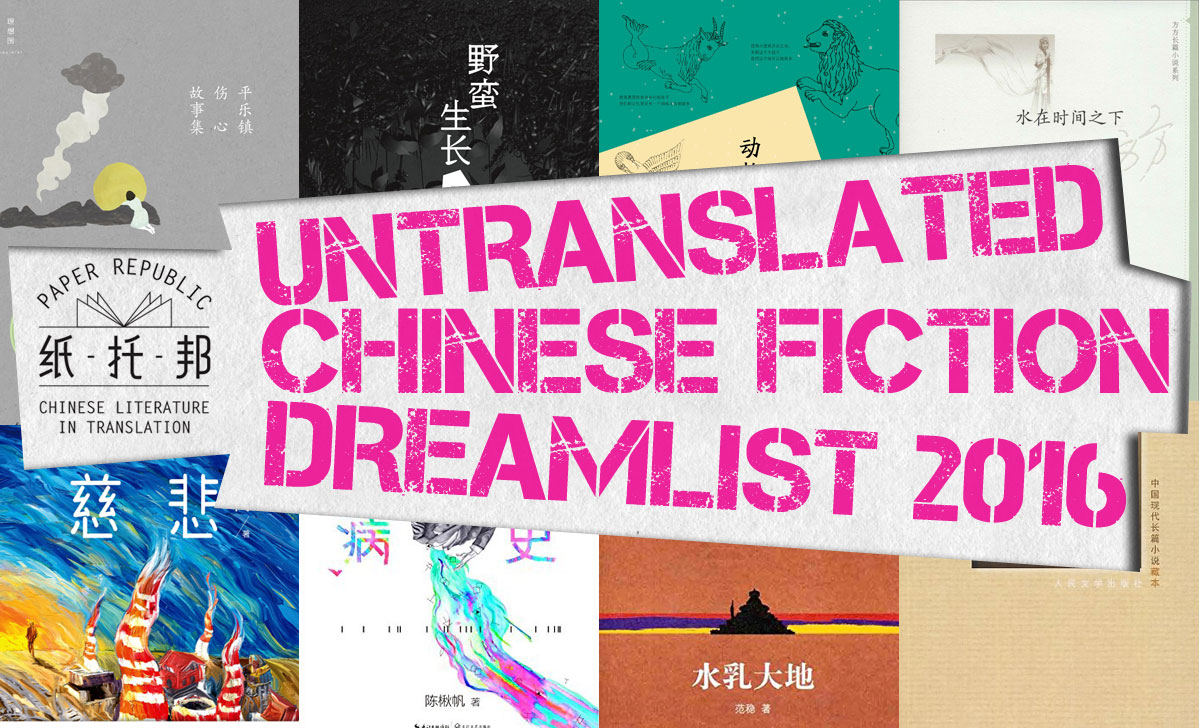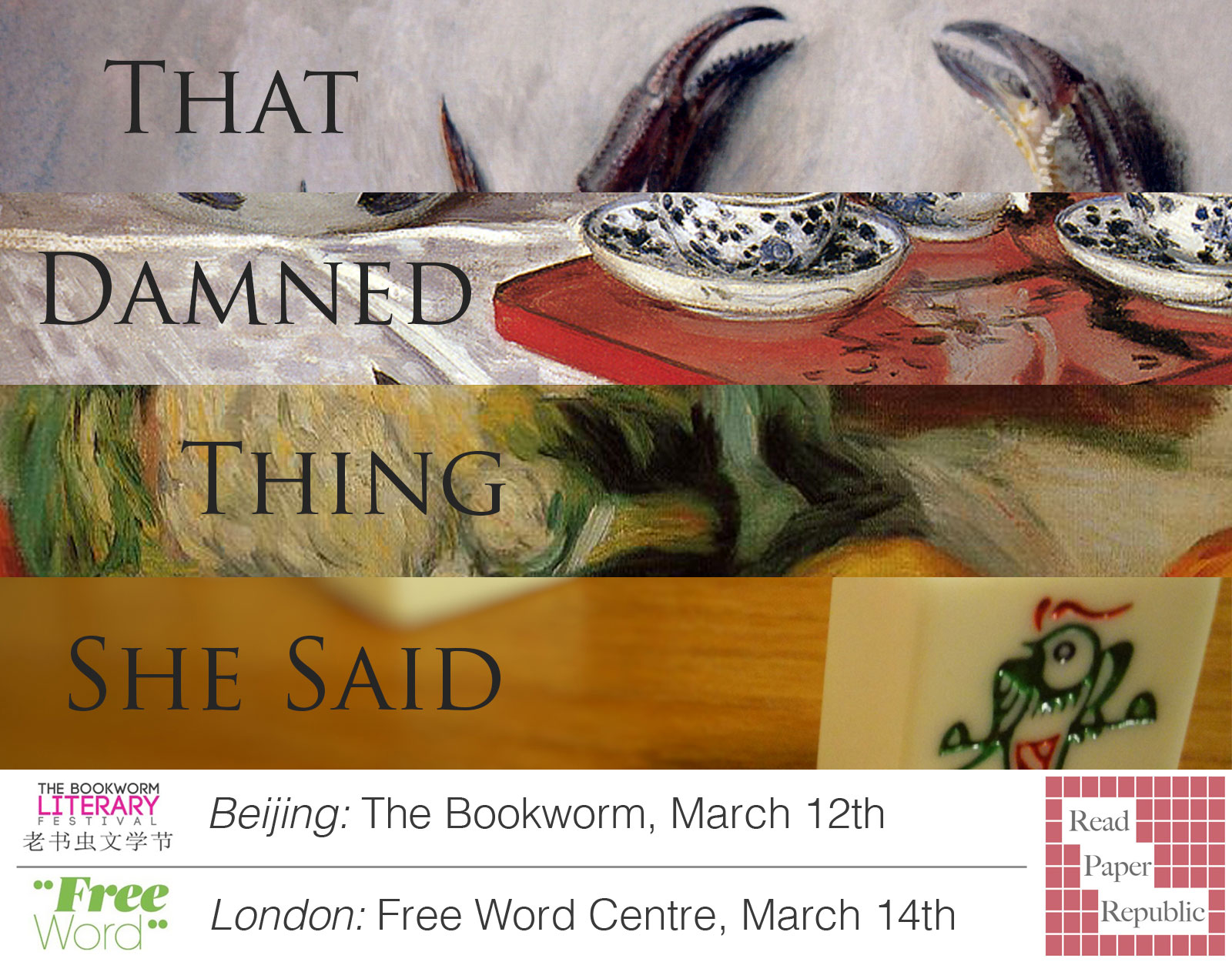Our News, Your News
By David Haysom, March 20, '16
I find searching for ways to make my work more efficient to be one of the most effective and rewarding methods of procrastination. Here are a few of the apps, websites and pieces of machinery I’ve discovered on that quest.
More…
"Ruined City is notable for its almost complete indifference to its historical moment. While the Cultural Revolution is referred to in places, it’s clear that Jia wants his characters to seem neither traumatized by nor interested in politics. They live in a tiny world of their own making and seem — like artists everywhere — to thrive on life’s small dissatisfactions. That may be the novel’s most shocking quality of all."
All this is understandable. Who wants to be the spoilsport to stand up and say that many pages of the Zibaldone were miserably translated and that to an extent the project was a missed opportunity? But I believe the question goes deeper than this and is perhaps symptomatic of the time we live in and the diminishing importance of the written word, and in particular of literature, in our society. Simply, many readers, many critics, don’t notice. Or if they do, don’t particularly care. They read for content. The clamor of idioms about us has become so loud that we hardly notice when a translation, or indeed any piece of prose, is cluttered with incongruities. In fact, the writer whose work was above all an achievement of style and linguistic density, an exploration of what could be done with the language, directed at a community who could understand the nature of the experiment—Joyce, Woolf, Gadda, Faulkner—is largely a creature of the past. And where, as in the case of the Zibaldone, the reader or critic finds sentences that are unreadable and quite likely skips or abandons the book, they imagine that this is because the original was of this nature and the translation necessarily impenetrable. They may even admire the translator for having got it into English at all.
Yan Lianke's The Four Books (四书) is one of 13 novels that has been longlisted for The Man Book International Prize.
Congrats to Yan Lianke and translator Carlos Rojas, who would split a hefty 50,000 pounds sterling if the book --- unpublished in the PRC, naturally --- wins.
By Helen Wang, March 7, '16

At the start of 2016, we decided to revisit the 2009 dream-list of untranslated Chinese novels recommended by the Paper Republic team. We wanted to see which of them had been translated (see update here), and to invite our readers to recommend titles for a new 2016 list.
Translators and agents, if you are working on samples, we’d like to add this information to the database – we can tag them as “excerpts” - you can search for a list of excerpts here. If you tell us that an "excerpt” is available from [a named person or job-title] at [literary agency], we can add this too! Think of it as free publicity!
More…
By Bruce Humes, March 5, '16
"Depictions of homosexuality, extramarital affairs, underage love and the supernatural are no longer allowed in television dramas under new regulations in mainland China," according to a report at Hong Kong Free Press (New Rules).
These rules are apparently already coming into affect. According to WSJ's China RealTime, " 'Heroin' (also known as “Addiction” in Chinese), a 15-episode Web drama about romance among teenage boys, was earlier this week taken down from major Chinese video streaming sites." This suggests that the ban applies not just to TV.
Will this ban on the portrayal of homosexuality, and "other abnormal sexual relationships and behavior," be extended to published writing as our man on the ground in Nanhai, XJP, exerts his Victorian values? Hard to say. For now, it would be neat to have a list of Chinese fiction --- particularly translated fiction or Chinese fiction you'd like to see translated --- touching on LGBT romance, lifestyles and issues. Please add to the list via the comments section.
Publishers of the state-sponsored, all-China 民族文学 (Nationalities Literature) monthly magazine have announced the award winners for articles published in 2015 (《民族文学》年度奖揭晓). The magazine appears in 6 languages: Kazakh, Korean, Mandarin Chinese, Mongolian, Tibetan and Uyghur.
The chairman of China South Publishing & Media Group, Gong Shuguang, offers advice to international publishers who want to work with Chinese companies.
Born in Fujian and raised in Zhejiang, Yu Xinqiao is one of the most popular and important poets in China today. After calling for a “Chinese Renaissance Movement” in 1993, Xinqiao was subsequently jailed for eight years. His poem “If I Have to Die,” set to music, has become an enormous arena-rock hit and stirring anthem of defiance. Yunte Huang, author of Charlie Chan and other works, is the editor of the new collection The Big Red Book of Modern Chinese Literature: Writings from the Mainland in the Long Twentieth Century, a panoramic literary anthology that includes writers from Nobel laureates Gao Xingjian and Mo Yan to Bei Dao, Yu Hua, Yu Xinqiao and others. Curated and hosted by Anderson Tepper.
By David Haysom, February 21, '16

As we announced last month, on March 14th London's Free Word Centre will be hosting "That Thing She Said", a speed bookclubbing event at which translators Roddy Flagg, Nicky Harman, Emily Jones and Helen Wang will be discussing short stories by authors Feng Tang, Fu Yuli, Li Jingrui, and Liu Qingbang. (You can find out more and purchase tickets here.)
We are delighted to announce that we will be holding the same event in Beijing as part of the Bookworm Literary Festival on March 12th. The Beijing line-up comprises Eric Abrahamsen, Dave Haysom, Nick Stember, plus one more participant TBC.
Tickets are available to purchase now online or at the Bookworm.
More…
By David Haysom, February 21, '16

As we announced last month, on March 14th London's Free Word Centre will be hosting "That Damned Thing She Said", a speed bookclubbing event at which translators Roddy Flagg, Nicky Harman, Emily Jones and Helen Wang will be discussing short stories by authors Feng Tang, Fu Yuli, Li Jingrui and Liu Qingbang. (You can find out more and purchase tickets here.)
We are delighted to announce that we will be holding the same event in Beijing as part of the Bookworm Literary Festival on March 12th. The China line-up: Eric Abrahamsen, Dave Haysom, Nick Stember, plus one more participant TBC.
UPDATE: We can now reveal that our fourth participant will be the writer Karoline Kan!
Tickets are available to purchase now online or at the Bookworm.
More…
By David Haysom, February 21, '16

Back in 2009 the Paper Republic team put together this dream-list of untranslated Chinese novels. It seems like it's about time to revisit the original list, see what progress has been made, and put together a new 2016 edition!
We're calling on you, our readers, to make your suggestions! Tell us about the Chinese novels you'd most like to see translated. Get your suggestions to us by Sunday 28th February, and we'll publish the 2016 dream-list in the first week of March.
More…
By Helen Wang, February 18, '16
Featuring authors Fan Xiaoqing, Qian Zhongshu, Dai Lai, Wang Dajin, Yan Huajun and Huang Fan.
More…
Uyghur Author Alat Asem's Novella Tapped for Translation into English . . . Zha Jianying on Ji Xianlin's newly translated The Cowshed: Memories of the Chinese Cultural Revolution (牛棚杂忆, 季羡林著) . . . Perhat Tursun, le Salman Rushdie de Chine se remet enfin à écrire . . . overseas sales of Liu Cixin's sci-fi novel, The Three-body Problem (三体, 刘慈欣著) reportedly top 100,000 . . . open letter from int'l publishers, booksellers and free speech advocates calling for HK head honcho Leung Chun-ying to defend press freedoms in the face of China's forced disappearances and detention of 5 HK-based publishing professionals . . . excerpt from Memtimin Hoshur’s This Is Not A Dream (بۇ چۈش ئەمەس) . . . Dhaka Art Summit censors Tibetan exhibit at request of China's ambassador . . . annual round-up of writing by minority authors published at Chinawriter.com.cn. . . . Pathlight to appear in Arabic, Korean and Spanish . . . Ai Weiwei plans Berlin memorial to drowned refugees . . . profiling the Hui in Ningxia
By Nicky Harman, February 14, '16
Frances Weightman, of Writing Chinese, Leeds University, UK, has sent this UPDATE: "Our 2nd Bai Meigui Chinese-English Translation Competition (run this year in collaboration with the ever so fabulous Read Paper Republic) is open for entries and we are delighted to announce that we once again can offer the winner a full bursary to this summer's Translate in the City literary translation workshop at City University, London. We are grateful to the White Rose East Asia Centre for their generosity in facilitating this. The winning entry will also be published (details to follow). The deadline for entries is Wednesday 9th March, so plenty of time if you've not yet started.
The text this time is a short piece of reportage by Li Jingrui with all sorts of interesting bits to challenge even seasoned translators! So – do take up the challenge and click this link for more details on the text and how to enter.
Although comics and cartoons (known in Mandarin as manhua) have existed as form of popular entertainment in Taiwan for at least a century, in comparison to Japanese manga they are almost completely unknown to your everyday English-speaking comics fan.
By Eric Abrahamsen, February 8, '16
So, following custom in many places on the internet, we thought it
would be nice to do an end-of-the-year what-we’ve-been-up-to
retrospective, now that 2015 is nearly over and 2016 is right… What’s
that? 2015 already over? Not in our neighborhood! As far as we’re
concerned, these are the last days of Yi Wei (乙未), and come Monday
we’ll be entering Bing Shen (丙申), the Year of the Fire Monkey (hence
the excerpt from Journey to the West, aka “Monkey”, that we just
published on Read Paper Republic). None of this newfangled Gregorian
tomfoolery around here. We might consider the Julian calendar… but no.
What have we been up to over the past lunar year? Here’s a brief
rundown:
More…
By Bruce Humes, February 4, '16
I've just updated my guide.
This 民族题材文学 category includes writing — regardless of the author’s ethnicity — in which non-Han culture, motifs or characters play an important role. But the great majority of the works listed were penned by a member of one of China’s minority ethnic groups. There are entries for fiction (and a bit of poetry) touching on the Bai, Evenki, Hui, Kazakh, Kyrgyz, Manchu, Miao, Mongolian, Lahu, Lisu, Oirat, Seediq, Tibetan, Uyghur, Xiongnu and Yi peoples. Taiwan fiction is included, and the Tibetan section now features 25 entries. Unless noted, the original is in Chinese and the translation is in English. But I’ve also included a handful of renditions into French, Spanish and Japanese.




